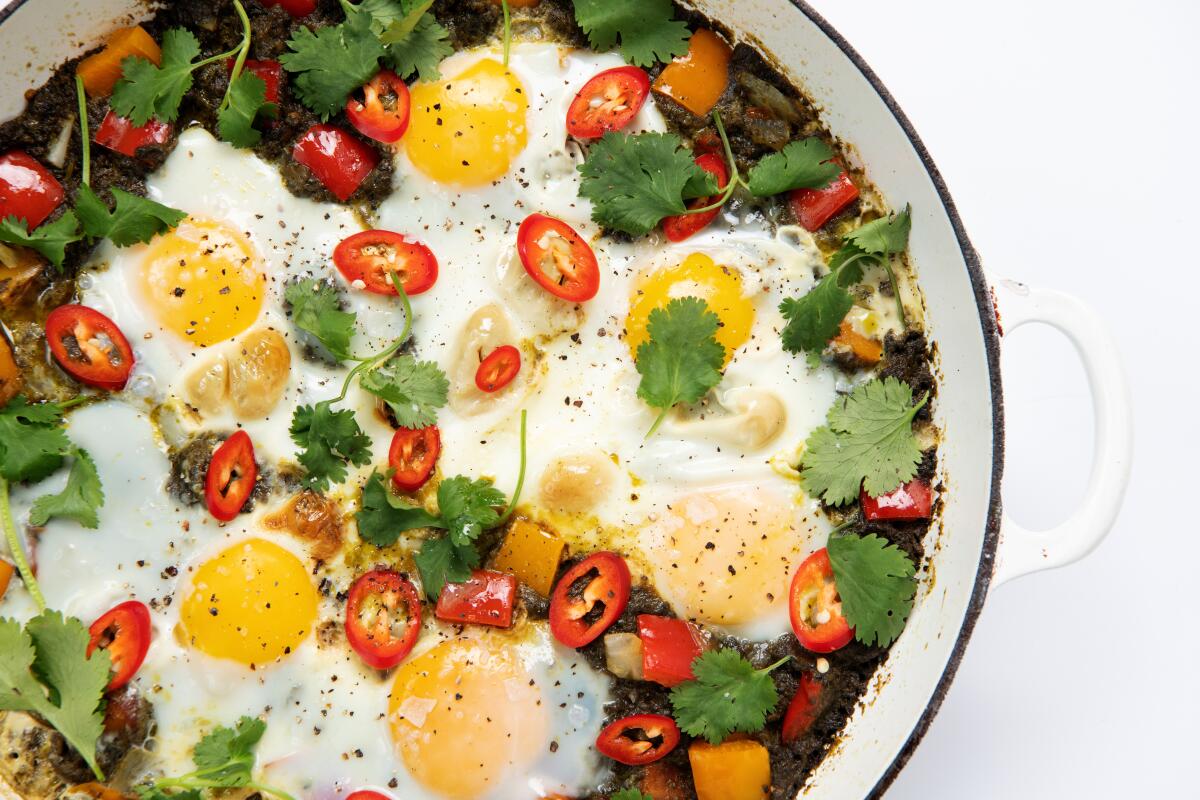The comforting egg dish chef Yotam Ottolenghi shares from his latest book

- Share via
You are reading our Cooking newsletter
Sign up to get a taste of Los Angeles — and the world — in your own home and in your inbox every Friday
You may occasionally receive promotional content from the Los Angeles Times.
When it comes to comfort food, we all have our go-to dishes. Recipes we reach for again and again that fill us up and remind us of home. Those are the recipes chef Yotam Ottolenghi and his collaborators highlight in his latest cookbook, “Comfort.”
Ottolenghi will be in conversation with Nancy Silverton at the Irvine Barclay Theatre on Oct. 13 to discuss his new book. I spoke with the acclaimed Israeli-born British chef, restaurateur and author last month about that upcoming appearance and all things comfort. Ottolenghi said he and his co-authors Helen Goh, Verena Lochmuller and Tara Wigley wanted to use this book as an opportunity to acknowledge the fact that comfort food can be culturally specific.
“What Helen, Verena, Tara and I are really focusing on here is the emotional impact food has on us,” said Ottolenghi. “Rather than come up with a list of recipes that are perceived as being comfort, like mashed potatoes and mac and cheese, we tried to bring up recipes that we like to cook at home and bring us a sense of comfort.”
Ottolenghi grew up in Israel with parents of Italian and German heritage, but he also spent summers in Italy and eventually moved to London as an adult. Each of the co-authors has their own unique background and journey, and the places they have called home influence their cooking.
Shakshuka, a breakfast dish of poached eggs and tomato sauce, is a dish Ottolenghi is credited with popularizing with the publication of his 2010 book, “Plenty.” While he grew up eating shakshuka, Goh grew up in Malaysia eating nasi lemak: egg, spicy sambal and coconut rice wrapped in banana leaves. Their egg sambal “shakshuka” recipe from “Comfort” takes cues from these two comfort foods from their different childhoods. Ottolenghi said the dish is also an example of how we can get comfortable with the cultures of our close friends.
“Helen and I have been friends for many, many years, and she is Malaysian and of a Chinese background but also grew up in Australia. I learned to love Malaysian food through her,” Ottolenghi said. “Now I have a nostalgia for that.”
When our friends feel like home, their food can too.
Here’s the recipe for their egg sambal “shakshuka” — and other versions of the homey breakfast dish.
Eating out this week? Sign up for Tasting Notes to get our restaurant experts’ insights and off-the-cuff takes on where they’re dining right now.
Check out our L.A. Times Food x Burlap and Barrel spice blends.
Egg sambal “shakshuka”
This version of egg sambal “shaksuka” takes inspiration from the nasi lemak Helen Goh grew up eating in Malaysia. Ottolenghi said while this recipe is very much not nasi lemak, it is nevertheless inspired by it. The egg and tomato sauce brings to mind the shakshuka that he grew up eating. This recipe is a perfect combination of the two and can be served with rice or flatbread.
Get the recipe.
Cook time: 1 hour. Serves 4.

Palak Paneer Shakshuka
This northern Indian version of shakshuka includes cilantro and creamy cubes of paneer cheese. Lean into the culturally specific flavors of this comforting dish by serving it with naan.
Get the recipe.
Cook time: 20 minutes. Serves 4 to 6.

Enjoying this newsletter?
Consider becoming a Times subscriber.
Shakshuka
For this recipe from Russ Parsons, the former L.A. Times Food editor references Ottolenghi’s more stripped-down shakshuka recipe from 2012’s “Jerusalem.” Parsons adds his own secret ingredient: Spanish pimenton de la Vera.
Get the recipe.
Cook time: 40 minutes. Serves 2 to 4.

Shakshuka
Go back to the source with this recipe adapted from 2010’s “Plenty” by Ottolenghi. Toasted cumin, saffron and muscovado sugar make the ordinary extraordinary, which is why so many home cooks enjoy Ottolenghi’s recipes in the first place.
Get the recipe.
Cook time: 1 hour. Serves 4.

Have a cooking question?
Eat your way across L.A.
Get our weekly Tasting Notes newsletter for reviews, news and more.
You may occasionally receive promotional content from the Los Angeles Times.




